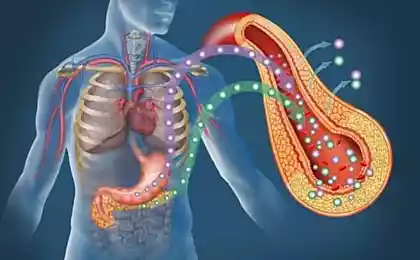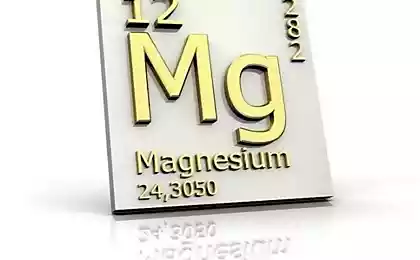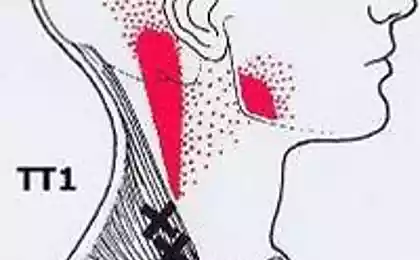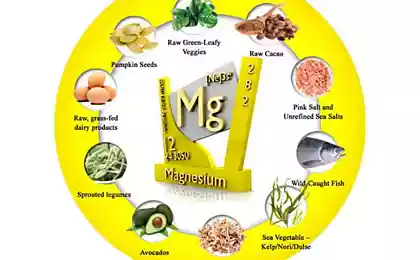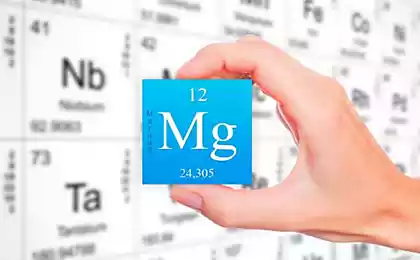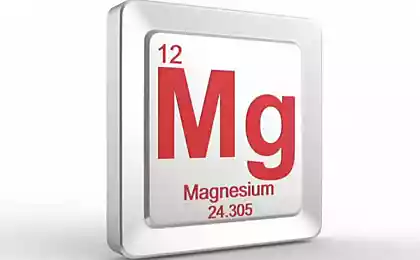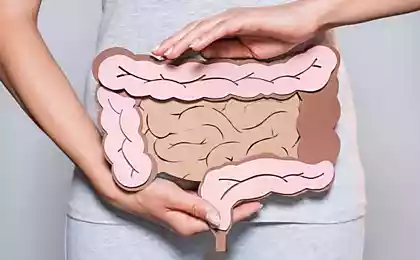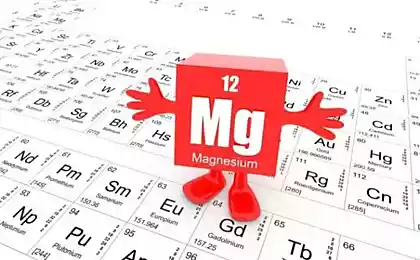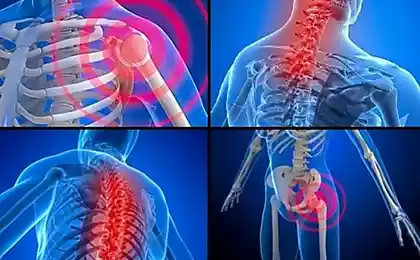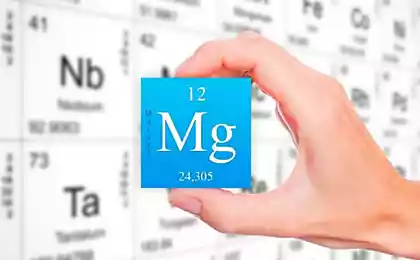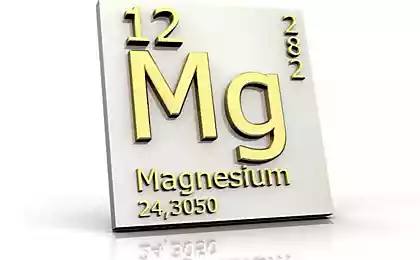697
10 troubling signs of lack of magnesium in the body that kill silently
Don't you think sometimes that You start to feel a little different, not quite normal, but it can't real understand why? It often happens when the body lacks magnesium. Yes, the signs of a magnesium deficiency in the body there are different from simple fatigue to the strongest stress...
You can consider yourself a very healthy person with no history of serious disease. However, in recent times, You can just feel tired, sleepy and so on ...

By the way, You might even have appealed to the doctor with Your symptoms? ... No? ...Maybe You have even received some recommendations from the doctor and even bought some medications, and can already take them? ...
But, like many others these medications do not provide any real effect. Is it? ...
Your doctor may tell You to drink more water and more sleep? Maybe he or she even recommends to take a vacation and relax? By the way this is a good recommendation, especially if You are willing to spend a little money and go to the beach ... We just love the sea ...
Okay about the sea that's another topic ...
But none of these recommendations is not working. You go to a more detailed examination, because no matter what You take, You still feel the emotion, the pain, and in some cases, I think that is seriously ill.
After You have passed the examination, endocrinologists, neurologists, gastroenterologists, rheumatologists and other doctors, do You still feel that medicine simply cannot help, all like peas in a brick wall.
So what could it be?
You just suffer from a disorder that is often overlooked, magnesium deficiency.
What is magnesium deficiency in the body?
Magnesium is an important mineral for us.
It is used in a huge number of processes in the body, responsible for more than 300 biochemical reactions. Adenosine triphosphate is a compound that provides energy to cells, contains magnesium and helps them to function properly.
There are a number of complications that can arise as a result of lack of magnesium in the body. This is a question that often is not even diagnosed by experts. And the worst thing is that often this deficiency is difficult to detect modern diagnostic methods.
Many benefits of magnesium to health are the transfer of nerve impulses, regulation of body temperature, detoxification, energy production and formation of healthy bones and teeth.
Magnesium deficiency in the body can be both primary and secondary. In the first case, the lack of this trace element is associated with congenital genetic defects.
Secondary deficiency is due to dietary habits, social conditions, lifestyle, stress, presence of diseases and physiological conditions in which the body increases the need for magnesium (pregnancy).
Magnesium directly regulates the state of cellular membranes and transmembrane transport of calcium ions and sodium independently involved in the reactions for the formation, accumulation, transfer, and utilization of the energy of free radicals and products of their oxidation.
The basic amount of magnesium is found in bone and dentin of the teeth, muscle and nerve tissue, liver, and kidney. Why it is so important for all our organs (kidneys, heart, liver and others). The major role of magnesium is that it serves as a natural anti-stress factor that hinders the development of the processes of excitation in the Central nervous system and reduces sensitivity to external influences.
Generally 1/2 — 1/3 of the total magnesium in the body is contained in bone tissue. About 1% of the total amount of magnesium in the body is found in extracellular fluid and plasma. Precisely for this reason, magnesium deficiency is almost impossible to diagnose, no blood test nor many advanced methods ...
And when people experience health problems, they think they have some nutrient deficiencies, such as iron or something else, but not magnesium.
Today, many scientists believe that we should receive at least two times more magnesium than we get currently.
What are the causes of magnesium deficiency?

Diet or Your meal plan plays a significant role in magnesium deficiency, but not because the food you eat with a low content of magnesium. Most likely, this is because the foods You eat today are actively removes it from the body.
This is largely due to an unhealthy modern diet. We consume an abundance of carbohydrates, caffeinated drinks and alcohol on a regular basis. Regular consumption of such products leads to a deficiency of magnesium.
Alcohol consumption is affected because it does not allow the body to absorb vitamin D, which helps in turn in the absorption of magnesium. As well as the sugars in the alcohol and other foods, regularly removes magnesium as waste.
The caffeine acting as a diuretic, cleanses the body of all kinds of nutrients and magnesium too.
Plus, due to soil depletion, our food is poor in minerals. Are now actively using chemical fertilizers, pesticides and insecticides in the cultivation of monocultures, which penetrate into the soil. Therefore, in the upper layers of the soil is the depletion of minerals. "Master mineral" magnesium is missing in most parts of the topsoil, resulting in the majority of the population is experiencing its deficit.
Much derive magnesium and many medicines. You probably have heard the expression: one treat, another cripple... of course you do Not want to offend anyone, but this is often the case...
Signs of low magnesium in the body
If you have a magnesium deficiency in the body You may feel some signs.
1. Fatigue

This is one of the first reasons why sufferers of chronic fatigue syndrome taking magnesium supplements.
Of deficiency, which often affects your overall wellbeing. People who have magnesium deficiency, you feel tired, complain of fatigue, morning fatigue, even after a long sleep.
This results in a constant state of stress. When you are in a constant, chronic state of stress, You use of magnesium more than usual, which leads to further fatigue. Being unable to cope with stress lead to a further reduction of magnesium this process can get stuck.
It's awful ...
2. Lack of magnesium leads to insulin resistance

According to the clinic of the Moscow Institute of Cybernetic medicine, the lack of magnesium reduces sensitivity of receptors to insulin, the defective response to insulin affects both the capture cells of glucose and to transport magnesium into cells.
In addition, magnesium deficiency has a negative impact on the secretion and activity of insulin, which promotes formation and progression of insulin resistance, which leads to lower metabolism.
All of this leads to problems with the gastrointestinal tract. All clinging to one for one and we become completely wrong ...
Now you know, magnesium helps You get the most from your nutrition.
3. Magnesium deficiency leads to insomnia

We are constantly in a hurry, life goes by in a routine. Before you know it — the day came to an end and it's time again to go to sleep.
Some even think that if people were awake 24 hours a day, to have time to do everything. But some people on the contrary there is a real problem with sleep.
According to some sources, on the quality of sleep is important to influence minerals such as calcium and magnesium. Magnesium is directly involved in the work and the synthesis of the nerve cells which command pulses sleep. Because this mineral is responsible for the good conductivity of the nerve channels and creates the conditions for the natural relaxation when required.
If You are curious to know about the causes of lack of sleep more, view a article!
4. Magnesium deficiency leads to muscle pain and problems with bones

Magnesium stimulates enzymes that help to normalize the level of calcium in Your body, as well as the level of potassium and other essential vitamins and minerals. It will also stop the excess calcium build up in Your muscle tissue.
Fibromyalgia, restless legs syndrome, muscle pain, seizures and other problems can be associated with lack of magnesium. When you consider that magnesium helps proper assimilation of many minerals and especially calcium, it will definitely help bone health.
5. Because magnesium deficiency is often nausea

Yes, that's right... the lack of minerals in the body, including magnesium, is a violation of their metabolism and absorption, which can cause serious discomfort. One of such unpleasant situations can be associated with nausea.
You may even eventually feel a strong weakness.
6. Apathy, stress, depression and ... lack of magnesium

Magnesium is closely associated with the right brain chemistry.
Depression is a psychological state, which is marked by a pessimistic mood and lack of activity. This problem is often treated with antidepressants. But scientists claim that there is a more gentle alternative for the treatment of depression.
Medical studies show that one of the reasons for depression can be lack of magnesium in the human body.
People who have symptoms of depression such as despondency, fatigue, loss of interest in life, anxiety, insomnia and even suicidal thoughts, tend to have a lack of this trace element.
Magnesium plays a key role in increasing the level of serotonin, also known as the hormone of happiness. Production of serotonin occurring in the brain, helps regulate mood, appetite and sleep.
Any abnormalities in levels of serotonin can negatively affect a person's mood, and ultimately cause depression. At deficiency of magnesium in the human body the level of serotonin decreases. Increased consumption of magnesium is able to correct an imbalance of serotonin and effectively to overcome depression.
Although I write a lot, however, the antidepressant effect of magnesium is not yet fully understood by medical science.
7. Anxiety, confusion in the head

Deficiencies of magnesium are associated with a strong susceptibility to mental problems, turning your brain into a boiling pot! ...
According to a study of a group of British scientists magnesium is a vital neurotransmitter, and is actually responsible for our body's ability to achieve the state of peace and harmony.
It is indispensable in the presence of post-traumatic stress, severe nervous tension, or any emotional experiences, preventing all functions of our organism from the effects of cortisol and norepinephrine, which can have the most detrimental impact.
It seems that taking magnesium helps keep you calm and collected...
8. Magnesium and cramps

We know that muscle storagemgmt occur at any age, but more annoying to persons of middle and old age.
In some cases, leg cramps are a symptom of diseases such as atherosclerosis (intermittent claudication), diabetes, varicose veins, cirrhosis of the liver, thyroid lesions and other.
However, according to some sources, 75% of people suffer from cramps, especially in the legs, because magnesium deficiency is experiencing approximately 80% of people. This is because of the improper diet, many people cannot gain the required daily rate.
9. Lack of magnesium causes problems with the brain

American researchers from the University of Austin, Texas concluded that through the intake of magnesium a person is able in some way to organize the work of his brain and thereby significantly improve memory.
The most important aspect of the effects of magnesium is that it stimulates the production of brain-derived neurotrophic factor, a component by which the brain does not allow your cells aging, effectively rejuvenates them. Thus, the magnesium among other things also protects our brain from various degenerative diseases, like Alzheimer's disease.
Also, scientists have discovered that regular consumption of magnesium increases the performance of synaptic plasticity of the brain – the brain's ability to resist the influence of such emotions as fear, anxiety, and post-stress feelings.
10. Magnesium deficiency causes problems with the cardiovascular system

Deficiency of magnesium reduces the elasticity of red blood cells, which complicates their passage through the capillaries, disturbs the microcirculation and shortens the life of red blood cells. This may be one reason of anemia.
Due to lack of magnesium the blood vessels are compressed, which increases blood pressure and this can lead to coronary heart disease. Oh, it is scary...
Therefore, magnesium deficiency even accelerates the aging process.
If You are still struggling to blood pressure try to pass additional tests to establish the level of magnesium in blood... Perhaps it is the solution to Your problems ...
How to prevent magnesium deficiency

If you have any of these above mentioned unexplained symptoms, You can consult a doctor or try to change your diet.
To ensure the body's magnesium is not only important to consume foods rich in this element!
The daily requirement for magnesium is 310-420 mg for adults. During pregnancy and lactation the need for magnesium is increased by 20-30% (340-355 mg) in athletes up to 450 mg.
The balanced diet is able to provide the human body sufficient amounts of magnesium and other nutrients. Of the products that contain the highest amount of magnesium should be allocated to wheat bran and germ of wheat grains (wheat germ) and ...
Some of the foods rich in magnesium:
You can also consider supplementing with magnesium and dietary Supplements, but they should be taken with caution and only with Your doctor's approval.
The body needs plenty of magnesium, but too much magnesium in the body is also harmful. By the muscular system of an excess of magnesium is manifested by weakness on the part of the nervous system – lethargy and apathy, on the part of the cardiovascular system by slowing heart rate and lowering blood pressure. In severe excess of magnesium weakness can go in flaccid muscle paralysis or the paralysis of the respiratory muscles.
So it's probably best to eat right... small amounts of magnesium are in many foods, so to create a varied diet will not be difficult.
The best way to fill the body with magnesium vegetable juice or at least increase the amount of vegetables in Your diet that little bit harder and Your level of magnesium in the body increase. It is desirable to choose a more clean, organic food grown in his garden.
Psychosomatics: a viral disease — the lack of meaning of lifeTechnique of relieving headaches and migraines
As A Conclusion
The recommendations to increase the level of magnesium in the body, which we gave at the end of the article, be sure to watch your lifestyle and diet. Drink less alcohol as possible. Alcohol doubles the power of removing magnesium from the foods You eat...
Magnesium is, as we have seen, an extremely important element for us. So make sure You always eat healthy food and You have a pretty balanced diet.
If you start to feel any of these symptoms, and suspect it may be the result of magnesium deficiency, just do not self-medicate without consulting a doctor. Better go for proper and balanced diet.
Source: ngrinko.com/2015/09/29/%D0%BF%D1%80%D0%B8%D0%B7%D0%BD%D0%B0%D0%BA%D0%B8-%D0%BD%D0%B5%D1%85%D0%B2%D0%B0%D1%82%D0%BA%D0%B8-%D0%BC%D0%B0%D0%B3%D0%BD%D0%B8%D1%8F-%D0%B2-%D0%BE%D1%80%D0%B3%D0%B0%D0%BD%D0%B8%D0%B7%D0%BC%D0%B5/
You can consider yourself a very healthy person with no history of serious disease. However, in recent times, You can just feel tired, sleepy and so on ...

By the way, You might even have appealed to the doctor with Your symptoms? ... No? ...Maybe You have even received some recommendations from the doctor and even bought some medications, and can already take them? ...
But, like many others these medications do not provide any real effect. Is it? ...
Your doctor may tell You to drink more water and more sleep? Maybe he or she even recommends to take a vacation and relax? By the way this is a good recommendation, especially if You are willing to spend a little money and go to the beach ... We just love the sea ...
Okay about the sea that's another topic ...
But none of these recommendations is not working. You go to a more detailed examination, because no matter what You take, You still feel the emotion, the pain, and in some cases, I think that is seriously ill.
After You have passed the examination, endocrinologists, neurologists, gastroenterologists, rheumatologists and other doctors, do You still feel that medicine simply cannot help, all like peas in a brick wall.
So what could it be?
You just suffer from a disorder that is often overlooked, magnesium deficiency.
What is magnesium deficiency in the body?
Magnesium is an important mineral for us.
It is used in a huge number of processes in the body, responsible for more than 300 biochemical reactions. Adenosine triphosphate is a compound that provides energy to cells, contains magnesium and helps them to function properly.
There are a number of complications that can arise as a result of lack of magnesium in the body. This is a question that often is not even diagnosed by experts. And the worst thing is that often this deficiency is difficult to detect modern diagnostic methods.
Many benefits of magnesium to health are the transfer of nerve impulses, regulation of body temperature, detoxification, energy production and formation of healthy bones and teeth.
Magnesium deficiency in the body can be both primary and secondary. In the first case, the lack of this trace element is associated with congenital genetic defects.
Secondary deficiency is due to dietary habits, social conditions, lifestyle, stress, presence of diseases and physiological conditions in which the body increases the need for magnesium (pregnancy).
Magnesium directly regulates the state of cellular membranes and transmembrane transport of calcium ions and sodium independently involved in the reactions for the formation, accumulation, transfer, and utilization of the energy of free radicals and products of their oxidation.
The basic amount of magnesium is found in bone and dentin of the teeth, muscle and nerve tissue, liver, and kidney. Why it is so important for all our organs (kidneys, heart, liver and others). The major role of magnesium is that it serves as a natural anti-stress factor that hinders the development of the processes of excitation in the Central nervous system and reduces sensitivity to external influences.
Generally 1/2 — 1/3 of the total magnesium in the body is contained in bone tissue. About 1% of the total amount of magnesium in the body is found in extracellular fluid and plasma. Precisely for this reason, magnesium deficiency is almost impossible to diagnose, no blood test nor many advanced methods ...
And when people experience health problems, they think they have some nutrient deficiencies, such as iron or something else, but not magnesium.
Today, many scientists believe that we should receive at least two times more magnesium than we get currently.
What are the causes of magnesium deficiency?

Diet or Your meal plan plays a significant role in magnesium deficiency, but not because the food you eat with a low content of magnesium. Most likely, this is because the foods You eat today are actively removes it from the body.
This is largely due to an unhealthy modern diet. We consume an abundance of carbohydrates, caffeinated drinks and alcohol on a regular basis. Regular consumption of such products leads to a deficiency of magnesium.
Alcohol consumption is affected because it does not allow the body to absorb vitamin D, which helps in turn in the absorption of magnesium. As well as the sugars in the alcohol and other foods, regularly removes magnesium as waste.
The caffeine acting as a diuretic, cleanses the body of all kinds of nutrients and magnesium too.
Plus, due to soil depletion, our food is poor in minerals. Are now actively using chemical fertilizers, pesticides and insecticides in the cultivation of monocultures, which penetrate into the soil. Therefore, in the upper layers of the soil is the depletion of minerals. "Master mineral" magnesium is missing in most parts of the topsoil, resulting in the majority of the population is experiencing its deficit.
Much derive magnesium and many medicines. You probably have heard the expression: one treat, another cripple... of course you do Not want to offend anyone, but this is often the case...
Signs of low magnesium in the body
If you have a magnesium deficiency in the body You may feel some signs.
1. Fatigue

This is one of the first reasons why sufferers of chronic fatigue syndrome taking magnesium supplements.
Of deficiency, which often affects your overall wellbeing. People who have magnesium deficiency, you feel tired, complain of fatigue, morning fatigue, even after a long sleep.
This results in a constant state of stress. When you are in a constant, chronic state of stress, You use of magnesium more than usual, which leads to further fatigue. Being unable to cope with stress lead to a further reduction of magnesium this process can get stuck.
It's awful ...
2. Lack of magnesium leads to insulin resistance

According to the clinic of the Moscow Institute of Cybernetic medicine, the lack of magnesium reduces sensitivity of receptors to insulin, the defective response to insulin affects both the capture cells of glucose and to transport magnesium into cells.
In addition, magnesium deficiency has a negative impact on the secretion and activity of insulin, which promotes formation and progression of insulin resistance, which leads to lower metabolism.
All of this leads to problems with the gastrointestinal tract. All clinging to one for one and we become completely wrong ...
Now you know, magnesium helps You get the most from your nutrition.
3. Magnesium deficiency leads to insomnia

We are constantly in a hurry, life goes by in a routine. Before you know it — the day came to an end and it's time again to go to sleep.
Some even think that if people were awake 24 hours a day, to have time to do everything. But some people on the contrary there is a real problem with sleep.
According to some sources, on the quality of sleep is important to influence minerals such as calcium and magnesium. Magnesium is directly involved in the work and the synthesis of the nerve cells which command pulses sleep. Because this mineral is responsible for the good conductivity of the nerve channels and creates the conditions for the natural relaxation when required.
If You are curious to know about the causes of lack of sleep more, view a article!
4. Magnesium deficiency leads to muscle pain and problems with bones

Magnesium stimulates enzymes that help to normalize the level of calcium in Your body, as well as the level of potassium and other essential vitamins and minerals. It will also stop the excess calcium build up in Your muscle tissue.
Fibromyalgia, restless legs syndrome, muscle pain, seizures and other problems can be associated with lack of magnesium. When you consider that magnesium helps proper assimilation of many minerals and especially calcium, it will definitely help bone health.
5. Because magnesium deficiency is often nausea

Yes, that's right... the lack of minerals in the body, including magnesium, is a violation of their metabolism and absorption, which can cause serious discomfort. One of such unpleasant situations can be associated with nausea.
You may even eventually feel a strong weakness.
6. Apathy, stress, depression and ... lack of magnesium

Magnesium is closely associated with the right brain chemistry.
Depression is a psychological state, which is marked by a pessimistic mood and lack of activity. This problem is often treated with antidepressants. But scientists claim that there is a more gentle alternative for the treatment of depression.
Medical studies show that one of the reasons for depression can be lack of magnesium in the human body.
People who have symptoms of depression such as despondency, fatigue, loss of interest in life, anxiety, insomnia and even suicidal thoughts, tend to have a lack of this trace element.
Magnesium plays a key role in increasing the level of serotonin, also known as the hormone of happiness. Production of serotonin occurring in the brain, helps regulate mood, appetite and sleep.
Any abnormalities in levels of serotonin can negatively affect a person's mood, and ultimately cause depression. At deficiency of magnesium in the human body the level of serotonin decreases. Increased consumption of magnesium is able to correct an imbalance of serotonin and effectively to overcome depression.
Although I write a lot, however, the antidepressant effect of magnesium is not yet fully understood by medical science.
7. Anxiety, confusion in the head

Deficiencies of magnesium are associated with a strong susceptibility to mental problems, turning your brain into a boiling pot! ...
According to a study of a group of British scientists magnesium is a vital neurotransmitter, and is actually responsible for our body's ability to achieve the state of peace and harmony.
It is indispensable in the presence of post-traumatic stress, severe nervous tension, or any emotional experiences, preventing all functions of our organism from the effects of cortisol and norepinephrine, which can have the most detrimental impact.
It seems that taking magnesium helps keep you calm and collected...
8. Magnesium and cramps

We know that muscle storagemgmt occur at any age, but more annoying to persons of middle and old age.
In some cases, leg cramps are a symptom of diseases such as atherosclerosis (intermittent claudication), diabetes, varicose veins, cirrhosis of the liver, thyroid lesions and other.
However, according to some sources, 75% of people suffer from cramps, especially in the legs, because magnesium deficiency is experiencing approximately 80% of people. This is because of the improper diet, many people cannot gain the required daily rate.
9. Lack of magnesium causes problems with the brain

American researchers from the University of Austin, Texas concluded that through the intake of magnesium a person is able in some way to organize the work of his brain and thereby significantly improve memory.
The most important aspect of the effects of magnesium is that it stimulates the production of brain-derived neurotrophic factor, a component by which the brain does not allow your cells aging, effectively rejuvenates them. Thus, the magnesium among other things also protects our brain from various degenerative diseases, like Alzheimer's disease.
Also, scientists have discovered that regular consumption of magnesium increases the performance of synaptic plasticity of the brain – the brain's ability to resist the influence of such emotions as fear, anxiety, and post-stress feelings.
10. Magnesium deficiency causes problems with the cardiovascular system

Deficiency of magnesium reduces the elasticity of red blood cells, which complicates their passage through the capillaries, disturbs the microcirculation and shortens the life of red blood cells. This may be one reason of anemia.
Due to lack of magnesium the blood vessels are compressed, which increases blood pressure and this can lead to coronary heart disease. Oh, it is scary...
Therefore, magnesium deficiency even accelerates the aging process.
If You are still struggling to blood pressure try to pass additional tests to establish the level of magnesium in blood... Perhaps it is the solution to Your problems ...
How to prevent magnesium deficiency

If you have any of these above mentioned unexplained symptoms, You can consult a doctor or try to change your diet.
To ensure the body's magnesium is not only important to consume foods rich in this element!
The daily requirement for magnesium is 310-420 mg for adults. During pregnancy and lactation the need for magnesium is increased by 20-30% (340-355 mg) in athletes up to 450 mg.
The balanced diet is able to provide the human body sufficient amounts of magnesium and other nutrients. Of the products that contain the highest amount of magnesium should be allocated to wheat bran and germ of wheat grains (wheat germ) and ...
Some of the foods rich in magnesium:
- Pumpkin seeds
- Sunflower seeds
- Soy beans
- Chard
- Black beans
- Avocado
- Cashew
- Spinach
- Brown rice
- Oat bran
- Pumpkin
- Sesame seeds
- Almonds
You can also consider supplementing with magnesium and dietary Supplements, but they should be taken with caution and only with Your doctor's approval.
The body needs plenty of magnesium, but too much magnesium in the body is also harmful. By the muscular system of an excess of magnesium is manifested by weakness on the part of the nervous system – lethargy and apathy, on the part of the cardiovascular system by slowing heart rate and lowering blood pressure. In severe excess of magnesium weakness can go in flaccid muscle paralysis or the paralysis of the respiratory muscles.
So it's probably best to eat right... small amounts of magnesium are in many foods, so to create a varied diet will not be difficult.
The best way to fill the body with magnesium vegetable juice or at least increase the amount of vegetables in Your diet that little bit harder and Your level of magnesium in the body increase. It is desirable to choose a more clean, organic food grown in his garden.
Psychosomatics: a viral disease — the lack of meaning of lifeTechnique of relieving headaches and migraines
As A Conclusion
The recommendations to increase the level of magnesium in the body, which we gave at the end of the article, be sure to watch your lifestyle and diet. Drink less alcohol as possible. Alcohol doubles the power of removing magnesium from the foods You eat...
Magnesium is, as we have seen, an extremely important element for us. So make sure You always eat healthy food and You have a pretty balanced diet.
If you start to feel any of these symptoms, and suspect it may be the result of magnesium deficiency, just do not self-medicate without consulting a doctor. Better go for proper and balanced diet.
Source: ngrinko.com/2015/09/29/%D0%BF%D1%80%D0%B8%D0%B7%D0%BD%D0%B0%D0%BA%D0%B8-%D0%BD%D0%B5%D1%85%D0%B2%D0%B0%D1%82%D0%BA%D0%B8-%D0%BC%D0%B0%D0%B3%D0%BD%D0%B8%D1%8F-%D0%B2-%D0%BE%D1%80%D0%B3%D0%B0%D0%BD%D0%B8%D0%B7%D0%BC%D0%B5/
